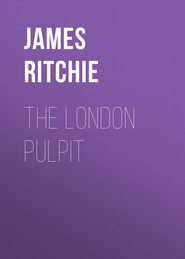По всем вопросам обращайтесь на: info@litportal.ru
(©) 2003-2024.
✖
Crying for the Light: or, Fifty Years Ago. Volume 1 of 3
Настройки чтения
Размер шрифта
Высота строк
Поля
‘What’s the matter, my poor boy?’ said the actress, as, heedless of the remarks of her companions, she stooped down to kindly pat the head of the little waif, who was at first too frightened to reply.
Slowly and reluctantly he opened his big blue eyes and stared, then he screwed up his mouth and began to cry.
‘Come, my little man,’ continued the actress, in her gentlest tone, ‘tell us what is the matter with you.’
‘Yes, tell the good lady what’s the matter with you!’ said the Vicar, who thought it was now high time for him to say something.
Even then the boy sulked. He was of a class apparently for whom respectability has few kind words or looks, who, in this wicked world, get more kicks than half-pence. Respectability has quite enough to do to look after her own children, especially now that taxes and butchers’ bills and School Board rates, to say nothing of coals, run up to such formidable items, to give herself much trouble about the children of other people. I have myself little pity for the heartless vagabonds who bring children into existence merely that they may rot and die. Of the devilish cruelty of such fathers and mothers no tongue can give an adequate idea; hanging is too good for them. It is to them we owe the pauperism which, apparently, it is beyond the power of the State to cure. I am sick of the cant ever uttered of population versus property; one is born of self-denial, industry, foresight, all the qualities which we as a nation require, while population is too often the result of unspeakable vice or consummate folly, qualities against which it becomes the nation to set its face.
But I must not forget the actress. More tenderly and coaxingly she repeated the question. To the charm of that voice and manner resistance was impossible.
Swallowing the rising tear with a great effort, slowly opening his eyes and mouth at the same time, and looking terribly frightened all the while, the poor lad replied:
‘Oh, ma’am, I’ve got such a pain in my head.’
‘Of course you’ve got a headache, lying like that in the sun. Why don’t you get away and run home?’
‘I ain’t got a home.’
‘Then, what are you doing here?’ said the Mayor.
‘Nothin’,’ said the boy.
‘So it seems,’ said the Vicar.
‘Where’s your father?’ asked the actress,
‘I ain’t got one.’
‘Then, where’s your mother?’
‘Gone off with a tramp, and she took brother with her.’
‘But why did not she take you as well?’
‘’Cause she said I was big enough to earn my own wittles and drink. But I must be off; here comes a bobby,’ said the boy, frightened at the appearance of one of the town police. Alas! he was too weak to run; he had had no food all day, and his only bed by night had been under some old waggon or in some old barn or loft, and, barefooted, he fell an easy prey to the representative of law and order.
‘Now, you young rascal,’ said the policeman, as he gave the lad a good shaking, apparently in order to test the strength of his ragged clothes, and, if possible, to make matters worse, ‘get out of this, and be off,’ an order which the poor lad would have obeyed had not the actress held his hand.
‘You know him,’ said she to the policeman.
‘Know him! of course I do. It was only last week I had him up before the magistrate.’
‘What for?’
‘For sleeping in the open air, and now here he is again. ’Tis very aggrawatin’. What’s the use of trying to do one’s duty if this sort of thing goes on?’
‘Is it a crime to sleep in the open air?’ asked the actress.
‘Well, you see, ma’am, it ain’t allowed by the magistrates; leastwise, not inside the borough.’
‘Poor little fellow!’ said the actress as she looked at the lad; ‘I’ll take him myself to the workhouse. There he would be out of harm’s way, and washed and fed, and made clean and comfortable.’
‘I beg your pardon, ma’am, that ain’t no use; you ain’t got a horder, and it is as much as the porter’s place is worth to take anyone in without a horder.’
‘Then, what’s to be done with the poor boy?’
‘Ah, that’s the question,’ said the policeman, and he was right there. What’s to be done with our boys, rich or poor, good or bad, is a question some of us find increasingly hard to answer.
‘Then you can’t help me?’ said the actress.
‘Oh no, mum; we’ve plenty of such boys about.’
‘What’s to be done?’ said the lady she still looked at the poor boy. ‘Is it right to leave him thus?’ There was a tear in her voice as she spoke. All seemed so hard and unmoved, and the urgency was so pressing.
‘Dear madam,’ said the Mayor, who felt himself bound to say something, ‘the case is a hard one, but there’s no help for it. We can’t encourage such hoys as that. If we did, the town would be overrun with them. They are always begging.’
‘I wasn’t beggin’,’ said the boy, who now began to feel interested in the discussion. ‘I don’t want to go beggin’. I want a job.’
‘Ah, all the boys say that,’ said the Vicar, ‘the young rascals! If I had my way, I would give them a good whipping all round.’
‘Yes, and if we listened to all these stories the bench would have to sit all day long,’ said the Town Clerk, giving the boy a copper and ordering him off.
‘Off,’ said the actress – ‘where to?’
‘To Parker’s Buildings,’ said the Mayor. ‘That’s where these young rascals live. There is not a worse place in the whole town.’
‘Nor in the country nayther,’ said the policeman. ‘It would be a good job if the whole place were burnt down.’ The policeman always backed up the opinions of his worship the Mayor, as, indeed, he did those of all his betters. It was a habit that paid.
‘Well, the poor boy looks really ill; can’t you get him into the hospital?’ asked the actress.
‘I am sorry,’ said the Vicar, ‘but the committee of the hospital don’t meet for a week, and we can do nothing in such a case. If it had been winter we could have sent him to the soup-kitchen; but in the summer-time we are not prepared for such an irregularity.’ At length a happy thought struck him. Turning to the boy, he said, ‘What’s your name, my little man?’
‘Little Beast.’
‘Little Beast! Good heavens! what a name for a child. Who gave you that name?’
‘Mother. Mother allus calls me Little Beast, ’cause I won’t let her hit brother.’
The boy spoke honestly, that was clear. There was some good in him; the devil had not yet got him in his grip. Was he to be saved? The Mayor, and the Town Clerk and the Vicar seemed inclined to answer that question in the negative. A passage of Scripture – a word of the Master’s – came into the actress’s recollection as she looked at the little waif, ragged, half starved, filthy, in their midst. Said the Master, when His disciples asked Him which should be greatest in the kingdom of heaven, taking a little child and setting him in their midst, ‘Except ye be converted and become as little children, ye shall not enter the kingdom of heaven. Whosoever, therefore, shall humble himself as this little child, the same is greatest in the kingdom of heaven, and whoso receiveth one such child in My name receiveth Me. Take heed that ye despise not one of these little ones, for I say unto you that in heaven their angels do always behold the face of My Father which is in heaven.’
‘Save the child,’ whispered the woman’s heart of the actress; ‘to-morrow it will be too late, and human law, with all its terrors, will track him, and he will be a rebel against man and God.’
‘Excuse me,’ said the Mayor, ‘but the train has been signalled, and will be in in a few minutes.’
‘I am ready,’ said the lady, ‘but the child goes with me.’ The child seemed to nestle under her wing, as it were. He was frightened by the others.
‘You don’t mean that!’ ‘It is impossible!’ ‘What an idea!’ were the respective utterances of Mayor, Vicar, and Town Clerk, who simultaneously stepped back a step or two, as if doubting whether the lady were in full possession of her senses and were desirous to settle that question by a fuller survey a little further off. It is astonishing how great a sensation is produced in this Christian country when anyone tries to reduce Christianity to practice, to get it to talk modern English, to bring it down from the clouds, and to make it walk the streets. Just then the station bell rang.











